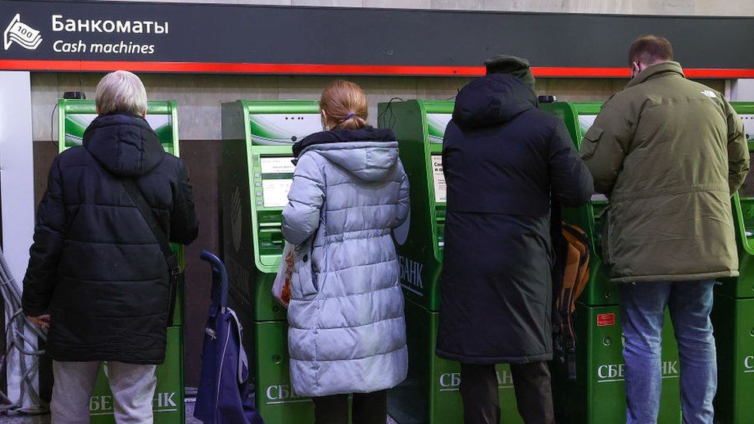Russia has more than doubled its key interest rate after the rouble slumped by 30% against the US dollar.
Bank of Russia said it raised the rate to 20% from 9.5% to help cushion the impact on prices of the rouble's slide.
It came as the UK, along with the US and EU, cut off Russia's banks from financial markets in the West.
Any UK entity is banned from undertaking transactions with Russia's central bank, its finance ministry and its wealth fund.
"The UK government will immediately take all necessary steps to bring into effect restrictions to prohibit any UK natural or legal persons from undertaking financial transactions involving the Central Bank of Russia, the Russian National Wealth Fund, and the Ministry of Finance of the Russian Federation," the government said.
The Russian currency hit a new record low after it emerged at the weekend that some of the country's banks will be banned from using the Swift international payment system.
On Sunday, Russia's central bank appealed for calm amid fears that there could be a run on the country's banks.
Will Walker-Arnott, senior investment manager at Charles Stanley, told the BBC's Today programme that "it looks like Russia is increasingly becoming an economic pariah, increasingly isolated from the global financial system".
The growing tensions also helped to push the price of Brent crude oil above $100 (£75) a barrel.
The move by the European Union, United States and their allies to cut off a number of Russian banks from Swift is the harshest measure imposed to date on Moscow over the Ukraine conflict.
The assets of Russia's central bank will also be frozen, limiting the country's ability to access its overseas reserves.
The intention is to "further isolate Russia from the international financial system", a joint statement said.
Russia is heavily reliant on the Swift system for its key oil and gas exports.
Investors were also wary on Monday after Vladimir Putin ordered Russia's military to put its deterrence forces, which include nuclear weapons, on "special alert".
Last week, Moody's said it was reviewing Russian bonds to possibly downgrade them to '"junk", which would put Russia in a league of riskier countries that usually have to pay more to borrow. Rival credit ratings agency S&P has already lowered the country to junk status.
At the weekend, Russia's central bank issued an appeal for calm amid fears that the new financial sanctions could spark a run on its banks.
It said it "has the necessary resources and tools to maintain financial stability and ensure the operational continuity of the financial sector".
A run on Russian banks would see too many people trying to withdraw money.
On Friday, Russia's central bank was forced to increase the amount of money it supplies to ATMs after demand for cash reached the highest level since March 2020.
On Monday, the bank said it had ordered brokers to suspend the execution of all orders by foreign legal entities and individuals to sell Russian investments.
It also said it had yet to decide whether to open markets other than foreign exchange and money markets on Monday.
Videos on social media appeared to show long queues forming at cash machines and money exchanges in Moscow.
Alexandre Moutin, head of investments at SMBC Private Wealth, believes "a bank run is already ongoing and will most likely intensify in the coming days".
"The military conflict will last longer than Putin expected and the reaction of the West and the global community might be more harmful that he expected too," he said.
On Monday, the European Central Bank (ECB) said several European subsidiaries of Sberbank Russia, which is majority owned by the Russian government, were failing or likely to fail due to reputational cost of the war in Ukraine.
Sberbank Europe AG, which had total assets of €13.64bn (£11.4bn) at the end of last year, along with its Croatian and Slovenian units, suffered a rapid deposit outflow in recent days and is likely to fail to pay its debts or other liabilities, said the ECB, which is the lenders' supervisor.
Latest Stories
-
Let’s prioritize research quality in higher education institutions for industrial growth-Prof. Nathaniel Boso
1 hour -
Herman Suede is set to release ‘How Dare You’ on April 24
5 hours -
Heal KATH: Kuapa Kokoo, Association of Garages donate 120k to support project
5 hours -
KNUST signs MOU with Valco Trust Fund, Bekwai Municipal Hospital to build student hostel
5 hours -
The influence Ronaldo has on people, Cadman Yamoah will have same on the next generation – Coach Goodwin
6 hours -
Gender Advocate Emelia Naa Ayeley Aryee Wins prestigious Merck Foundation Awards
7 hours -
South Africa bursary scandal suspects granted bail
7 hours -
Ecobank successfully repays $500m Eurobond due April 18
8 hours -
Re: Doe Adjaho, Torgbui Samlafo IV, call for Unity among Paramountcies in Anlo
8 hours -
Extortion and kidnap – a deadly journey across Mexico into the US
8 hours -
Rihanna says fashion has helped her personal ‘rediscovery’ after having children
8 hours -
Development Bank Ghana targets GH¢1bn funding for commercial banks in 2024
8 hours -
Shatta Movement apologises to Ghana Society of the Physically Disabled after backlash
9 hours -
Sammy Gyamfi writes: Tema-Mpakadan Railway Project; A railway line to nowhere
9 hours -
Bright Simons: Is the World Bank saving or harming Ghana?
10 hours

